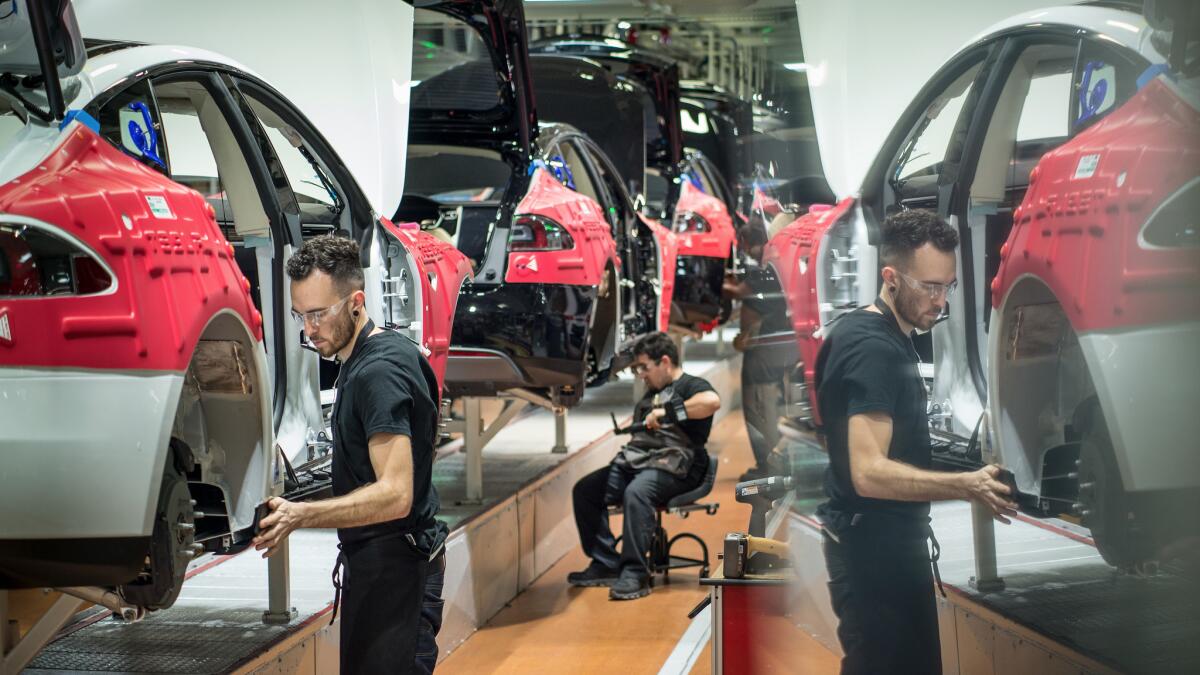Op-Ed: Globalization isn’t killing factory jobs. Trade is actually why manufacturing is up 40%.

- Share via
Foreign trade took a beating at both major party conventions, with speakers blaming free-trade agreements for all but wiping out U.S. manufacturing and eliminating millions of middle-class jobs. Both Donald Trump and Hillary Clinton have promised to renegotiate or abandon trade agreements with key U.S. trading partners such as Mexico and Canada. That would be a colossal mistake.
The number of manufacturing jobs in the United States has indeed been in a long decline since the late 1970s, but that disguises the true story of American manufacturing. Nostalgia for a bygone era blinds politicians and voters alike to the reality of a revitalized sector of the American economy that is thriving in a global market.
American factories and American workers are making a greater volume of stuff than ever — high-tech, high-value products that are competitive in markets around the world. In the last 20 years, which include enactment of the North American Free Trade Agreement and China’s entry into the World Trade Organization, real, inflation-adjusted U.S. manufacturing output has increased by almost 40%. Annual value added by U.S. factories has reached a record $2.4 trillion.
What has changed in recent decades is what our factories produce. Americans today make fewer shirts, shoes, toys and tables than we did 30 years ago. Instead, America’s 21st century manufacturing sector is dominated by petroleum refining, pharmaceuticals, plastics, fabricated metals, machinery, computers and other electronics, motor vehicles and other transportation equipment, and aircraft and aerospace equipment.
We produce more manufacturing value with fewer employees than in years past because today’s workers are so much more productive. They are better educated, equipped with more sophisticated capital machinery and turn out more valuable products than their parents’ generation. And as a result they are better paid, with total manufacturing payrolls rising during the last decade even as the number of workers declined.
The political anger about lost manufacturing jobs should be aimed at technology, not trade.
The political anger about lost manufacturing jobs should be aimed at technology, not trade. According to a recent study by the Center for Business and Economic Research at Ball State University, productivity growth caused 85% of the job losses in manufacturing from 2000 to 2010, a period that saw 5.6 million factory jobs disappear. In that same period, trade accounted for a mere 13% of job losses.
In fact, globalization and trade agreements have made a huge contribution to the ongoing success of American manufacturing. Access to expanding global markets allows U.S. manufacturers to enjoy economies of scale, reducing their per-unit production costs and enhancing their competitiveness. The additional revenue can be reinvested in research and development, leading to new products and expanding market share. This is why U.S. jobs in trade-oriented industries typically pay 18% more than non-trade-connected jobs.
Imports also play a critical role in the success of U.S. manufacturing. Measured in terms of value, more than half of what Americans import each year is not for consumption but for production. Being integrated into global supply chains allows U.S. manufacturers to source more affordable parts, components, raw materials and production equipment, making their final products more competitive. Hiking up tariffs on imported steel, to cite just one of Trump’s recent proposals, would raise production costs for a broad swath of U.S. industry, from autos to appliances, making them less competitive at home and abroad.
Like technology, globalization has allowed American manufacturing workers to “trade up” to more challenging and better-paying work. It has enabled the American manufacturing sector to specialize in what we do best: making products that embody American engineering and innovation. And thanks to trade agreements and lower trade barriers generally, we can then sell more of what we make to people in other countries, in exchange for apparel and other lower-tech products that we make less of but still need. In that way, trade blesses Americans twice over: It creates a better mix of jobs and delivers lower prices for everyday consumer goods.
Global trade has put some Americans out of work. But the total numbers are small compared with the overall national job churn. Indeed, millions of U.S. jobs are eliminated each year by technology and changing consumer tastes, only to be replaced by new jobs that are being created by the same dynamic forces.
The right response to anxieties about trade is to invest more in education, retraining and enhanced labor mobility, not to pick trade fights with other nations that would put in jeopardy the success of America’s modern, competitive manufacturing sector.
Daniel Griswold is a senior research fellow and co-director of the Program on the American Economy and Globalization at the Mercatus Center at George Mason University.
Follow the Opinion section on Twitter @latimesopinionand Facebook
More to Read
A cure for the common opinion
Get thought-provoking perspectives with our weekly newsletter.
You may occasionally receive promotional content from the Los Angeles Times.










